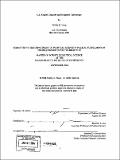| dc.contributor.advisor | Kenneth A. Oye. | en_US |
| dc.contributor.author | Hung, Shirley Kon-Jean | en_US |
| dc.contributor.other | Massachusetts Institute of Technology. Dept. of Political Science. | en_US |
| dc.date.accessioned | 2005-09-27T18:10:01Z | |
| dc.date.available | 2005-09-27T18:10:01Z | |
| dc.date.copyright | 2004 | en_US |
| dc.date.issued | 2004 | en_US |
| dc.identifier.uri | http://hdl.handle.net/1721.1/28754 | |
| dc.description | Includes bibliographical references (p. 111-118). | en_US |
| dc.description | Thesis (S.M.)--Massachusetts Institute of Technology, Dept. of Political Science, 2004. | en_US |
| dc.description.abstract | (cont.) effort that eventually paid off in 1999. Interest group politics also factors into the actions of the national security establishment as they also lobby the Presidency and Congress to maintain restrictive encryption regulations. The study uses organizational culture to explain the motivations and some of the actions of the NSA, particularly with regard to its preference for secrecy, its placement of national security above other values, and its efforts to maintain control over all cryptology, whether government or civilian. | en_US |
| dc.description.abstract | This thesis seeks to explain why the U.S. government export controls on encryption technologies instituted during the 1970s remained in place until 1999 even though the widespread availability of similar products internationally had rendered the regulations largely without national security benefit by the late 1980s and early 1990s. The second part of the thesis explores the processes and reasons behind the eventual liberalization of encryption policies in 1999. Underlying the study is a values tradeoff between national security, economic interests, and civil liberties for which the relative gains and losses to each value shift through the three decades of the study as a result of technological advances in commercial and civilian cryptography, the growing popularity of electronic communications, the rise of the computer software industry, and the end of the Cold War. The explanation rests upon a combination of political science and organization theories. Structural obstacles to adaptation within the legislative process and interest group politics help account for some of the inertia in the policy adaptation process. In particular, regulatory capture of the Presidency and critical Congressional committees by the National Security Agency helped lock in the NSA's preferred policies even after technological advancements in the commercial sector began to cut into the national security benefits resulting from export controls. Interest group politics also helps explain the rise and eventual success of the lobby for liberalization of encryption regulations. A combination of the software industry and civil liberties activists intent on preserving the right to privacy and First Amendment allied to lobby Congress to change encryption regulations, an | en_US |
| dc.description.statementofresponsibility | by Shirley K. Hung. | en_US |
| dc.format.extent | 118 p. | en_US |
| dc.format.extent | 7654301 bytes | |
| dc.format.extent | 7639628 bytes | |
| dc.format.mimetype | application/pdf | |
| dc.format.mimetype | application/pdf | |
| dc.language.iso | en_US | |
| dc.publisher | Massachusetts Institute of Technology | en_US |
| dc.rights | M.I.T. theses are protected by copyright. They may be viewed from this source for any purpose, but reproduction or distribution in any format is prohibited without written permission. See provided URL for inquiries about permission. | en_US |
| dc.rights.uri | http://dspace.mit.edu/handle/1721.1/7582 | |
| dc.subject | Political Science. | en_US |
| dc.title | U.S. export controls on encryption technology | en_US |
| dc.title.alternative | US export controls on encryption technology | en_US |
| dc.type | Thesis | en_US |
| dc.description.degree | S.M. | en_US |
| dc.contributor.department | Massachusetts Institute of Technology. Department of Political Science | |
| dc.identifier.oclc | 59822564 | en_US |
